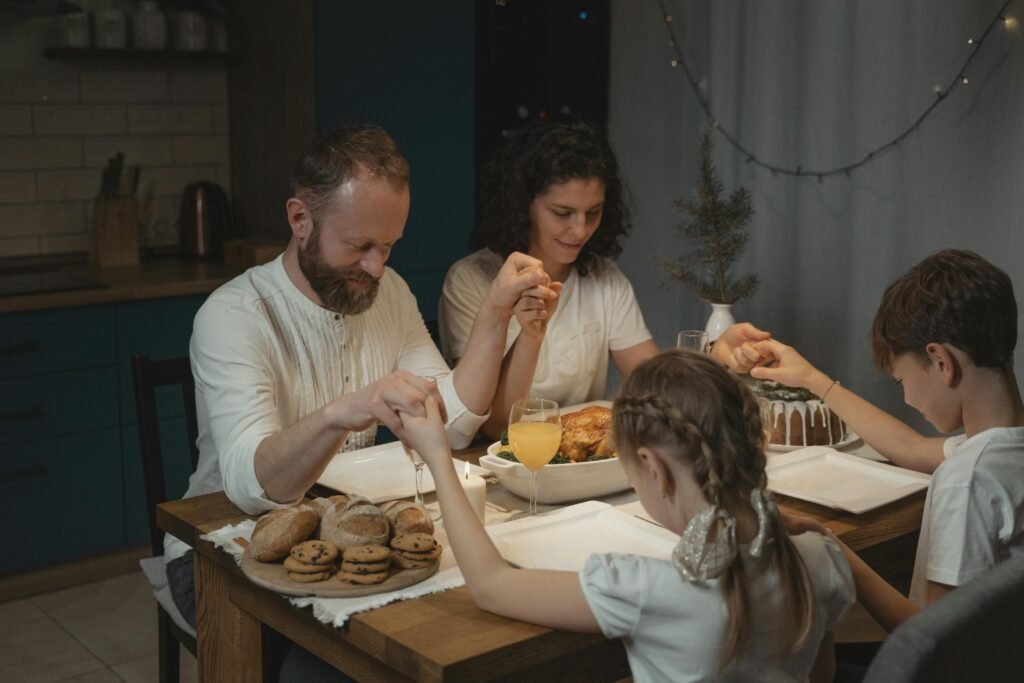
Ever been torn between what your faith teaches and what modern parenting books suggest? You’re not alone. About 63% of parents say their religious beliefs directly influence their parenting decisions daily.
The intersection of faith and parenting isn’t just philosophical—it’s intensely practical. How we guide our children, set boundaries, and teach values flows directly from our spiritual foundation.
This faith-based parenting approach doesn’t mean raising little robots who follow rules blindly. It’s about cultivating little humans who understand the “why” behind their actions and develop a moral compass that works even when no one’s watching.
But here’s what most religious parents aren’t talking about: the struggle to balance timeless teachings with a rapidly changing world that your kids navigate every day.
Faith’s Foundation in Parenting Values

Core beliefs that shape family priorities
Parenting isn’t just about making sure your kids eat vegetables and do their homework. It goes much deeper when faith enters the picture. Your beliefs become the invisible framework that guides every decision.
Think about it. If your faith teaches generosity, you’ll likely prioritize giving and service in your family culture. Maybe that looks like volunteering together or teaching your children to share with siblings before themselves.
Faith shapes what you celebrate too. Religious holidays aren’t just days off school—they’re opportunities to connect your children to something bigger than themselves. The traditions you choose to emphasize tell your kids what matters most.
I’ve seen families where prayer before meals is non-negotiable, while others prioritize weekly worship attendance above sports commitments. These aren’t random choices—they reflect core convictions about what makes a meaningful life.
Instilling moral compass through religious teachings
Kids are constantly watching us, figuring out how the world works. Religious teachings provide ready-made stories and principles that help explain complex moral ideas.
The beauty of faith-based morality is that it offers children something concrete. Instead of vague instructions like “be good,” religious teachings provide specific examples: forgive others, tell the truth, respect your parents.
Scripture stories work wonderfully here. Children connect with characters like Joseph forgiving his brothers or the Good Samaritan helping someone different from himself. These narratives stick with kids far longer than abstract lectures about right and wrong.
Many parents find that religious communities reinforce these lessons. When children hear the same values from multiple trusted adults, those principles sink deeper roots.
Balancing faith traditions with modern parenting approaches
This is where many of us struggle. We want to honor traditions passed down through generations while acknowledging that parenting has evolved.
The good news? You don’t have to choose. The most effective faith-based parents I know blend timeless wisdom with contemporary understanding.
For example, traditional teachings about respecting authority can coexist with modern approaches that value a child’s voice and perspective. You can pray with your children while also acknowledging scientific explanations for how the world works.
Technology presents both challenges and opportunities. While screens might compete with family prayer time, apps and online resources can make faith practices more accessible and engaging for digital-native kids.
The key is intentionality. Rather than blindly following either tradition or trends, thoughtful parents evaluate each practice by asking: “Does this help my child develop spiritually while preparing them for the world they’ll inhabit?”
Daily Spiritual Practices for Families

Age-appropriate prayer and worship routines
Kids grow at different speeds – and their spiritual life does too. A 3-year-old won’t connect with faith the same way a teenager will.
For little ones, keep prayers short and sweet. A simple “Thank you God for my family” before bed creates a foundation. Try picture books with religious themes that make concepts tangible.
For elementary-aged kids, give them more ownership. Let them lead family prayers or create prayer jars where everyone contributes intentions. Morning blessings before school can become a cherished routine.
Tweens and teens need space to question. Prayer journals work well here, letting them process privately. Family worship might include discussion time where they can voice doubts without judgment.
The key? Consistency beats perfection. Even 5 minutes of daily connection builds stronger foundations than occasional marathon sessions.
Incorporating sacred texts into family discussions
Sacred texts shouldn’t collect dust on shelves. They need to breathe in your daily conversations.
When your 6-year-old feels left out at school, that’s your opening to share stories of belonging from your tradition. When siblings fight over toys, wisdom about sharing suddenly becomes relevant.
Try these practical approaches:
- Choose age-appropriate versions of texts
- Focus on stories first, deeper theology later
- Ask open-ended questions: “What would you have done if you were Noah?”
- Connect ancient wisdom to modern challenges
The dinner table makes a perfect classroom. Questions like “What made you feel close to God today?” invite natural discussions where sacred texts provide guidance rather than rigid rules.
Creating meaningful religious rituals at home
Your home can become sacred space through simple, intentional rituals.
Morning blessings transform ordinary breakfasts into moments of gratitude. A dedicated prayer corner with candles, symbols, or family photos creates visual reminders of your values. Even bedtime routines gain deeper meaning when paired with short readings or prayers.
Rituals mark life transitions beautifully. When a child loses a tooth, graduates a grade, or overcomes a challenge, small ceremonies acknowledge God’s presence in these moments.
The power lies in repetition. That Sabbath candle lighting or evening prayer might seem routine to you, but for your children, these rituals are building a foundation of security and identity.
Don’t worry about perfection. The slightly off-key hymns and stumbled prayers often become the most treasured memories.
Celebrating faith-based holidays with purpose
Religious holidays easily become about presents and food rather than meaning. The fix? Intentionality.
Before each celebration, gather the family to discuss its significance. For younger kids, craft projects reinforce stories. A simple Advent calendar with daily acts of kindness brings Christmas back to giving. A Passover Seder becomes more meaningful when children help prepare symbolic foods.
Service projects during holidays connect faith to action. Delivering meals, visiting nursing homes, or making care packages teaches that faith extends beyond your four walls.
Create your own family traditions too. Maybe it’s reading specific stories, cooking grandma’s special recipe, or visiting meaningful places. These become powerful memory anchors that children carry into adulthood.
Remember – holidays aren’t tests of your Pinterest skills. The messy, imperfect celebrations filled with conversation often plant the deepest spiritual roots.
Navigating Difficult Conversations Through Faith

Addressing suffering and loss with spiritual perspectives
Faith gives us a framework when the hardest questions come up. When your child asks why their goldfish died or why grandma got sick, having spiritual perspectives helps immensely.
Kids sense when we’re uncomfortable. They can tell when we’re making stuff up. But they also need hope when facing tough realities.
I remember when my daughter’s friend moved away. She was devastated. Instead of just saying “sometimes people leave,” we talked about how God is with her friend in the new city too. We prayed together for her friend’s transition. This gave my daughter something active to do with her sadness.
The key isn’t having perfect answers. It’s being willing to say, “I don’t know exactly why this happened, but here’s what I believe about God’s presence in hard times.”
Using faith teachings to explain complex moral issues
When my son asked why some kids at school were mean to others, I could have just said “be nice.” Instead, we talked about how everyone is made in God’s image.
Faith gives children a “why” behind the rules. It’s not just “don’t lie” but “we’re truthful because truth reflects God’s character.”
Start with stories. Religious traditions are full of them. When my kids were struggling with sharing, we read about early believers who shared everything. This made more impact than just ordering them to share.
Balancing scientific understanding with religious beliefs
Science and faith aren’t enemies in your parenting toolkit. They answer different questions.
When explaining how babies are born, I include both biology and the miracle of God’s design. When discussing dinosaurs, I acknowledge scientific discoveries while maintaining that God created all things.
This approach teaches kids critical thinking. They learn that different types of questions require different approaches. Some questions are answered through microscopes, others through prayer and scripture.
The goal isn’t to force an either/or choice but to show how science and faith together give us a fuller picture of our amazing world.
Faith Communities as Parenting Support Systems

Leveraging church/temple/mosque resources for family growth
Walking into your faith community with kids in tow isn’t just about Sunday service or holiday celebrations. It’s a goldmine of support that many parents miss out on.
Most religious institutions offer way more than weekly gatherings. They run parenting classes where you can learn alongside others facing the same challenges. Many provide childcare programs designed with spiritual values at their core. And don’t overlook those family counseling services – often available at no cost to members.
The beauty? These resources come wrapped in your shared belief system. When a Sunday school teacher reinforces the values you’re teaching at home, your parenting message gets amplified without extra effort on your part.
Building relationships with like-minded families
Finding your parenting tribe changes everything. These connections aren’t just playdates – they’re lifelines.
When your child sees other families making similar choices, it normalizes your family values. Suddenly, you’re not the only weird parents who pray before meals or skip certain movies.
These relationships create a safety net too. Need emergency childcare? Someone to talk to when your teen is questioning everything? Your faith community friends get it because they’re living it too.
Text your faith community friends after a rough day, and you won’t have to explain why teaching your four-year-old about forgiveness matters so deeply to you. They already know.
Finding mentors who share your spiritual values
Parenting doesn’t come with a manual, but mentors are the next best thing.
Look around your faith community for families a few steps ahead of yours. That couple whose teenagers actually talk to them at coffee hour? The empty nesters whose adult children still come to services? They’ve navigated the waters you’re just entering.
Most spiritual communities have natural mentoring opportunities – committee work, volunteer projects, or social events where you can observe seasoned parents in action.
Don’t be shy about asking specific questions: “How did you handle Santa Claus questions while keeping faith central?” or “Any tips for teenage dating boundaries that honor our beliefs?”
Participating in community service as a family
Rolling up your sleeves alongside your kids does something powerful – it puts faith into action.
When children sort donations at the food pantry or visit elderly members, abstract concepts like compassion become tangible. They’re not just hearing about being generous; they’re experiencing it.
Service projects create natural opportunities for deeper conversations too. That homeless shelter visit sparks questions about justice, privilege, and responsibility that might never come up during a regular dinner chat.
Plus, serving together creates family memories tied to your values. Years later, your kids won’t remember every sermon they heard, but they’ll remember how it felt to deliver those holiday baskets together.
Respecting Children’s Spiritual Journey

Allowing space for questions and doubts
Ever notice how children ask the most profound spiritual questions? “Who made God?” “Why do bad things happen?” These aren’t signs of disrespect—they’re healthy expressions of developing faith.
Give your kids permission to ask tough questions. When my daughter questioned why God allows suffering, I didn’t panic. Instead, I said, “That’s something many adults wonder too. Let’s explore it together.”
Don’t rush to provide neat answers. Sometimes saying “I don’t know, but I trust God anyway” teaches more than pretending to have all the solutions.
Supporting their personal relationship with faith
Your child’s faith journey won’t mirror yours exactly—and that’s okay. Faith isn’t inherited like eye color; it’s discovered through personal experience.
Create opportunities without pressure. Family devotions, serving others together, or simply pointing out God’s presence in everyday moments can spark authentic connection.
Pay attention to how your child naturally connects with spirituality. Some find God through nature, others through music or quiet reflection. Support their unique pathway.
Adjusting expectations as children develop their own beliefs
As kids grow, expect their faith to evolve. What worked for your eight-year-old won’t resonate with your teenager.
The preschooler who loved Bible stories might become the teen who needs space to process doubts. Don’t panic—this questioning often leads to deeper, more resilient faith.
Remember that spiritual growth isn’t linear. There will be seasons of enthusiasm and seasons of apparent disinterest. Your steady presence matters through both.
Modeling authentic faith rather than forcing compliance
Kids can spot fake faith a mile away. They don’t need perfect parents—they need real ones who apologize when wrong and openly navigate their own spiritual questions.
Share your struggles appropriately. “I was disappointed about that job loss, but here’s how prayer helped me find perspective” teaches more than pretending faith eliminates all problems.
Live what you believe Monday through Saturday, not just Sunday morning. Your kids are watching how you treat the cashier, talk about neighbors, and handle stress.
Creating a home environment of grace and forgiveness
Faith flourishes in homes where mistakes aren’t catastrophic. When your ten-year-old lies about homework, address the behavior while affirming their worth.
Practice forgiveness visibly. Say “I forgive you” and mean it. Ask for forgiveness when you mess up.
Celebrate growth, not perfection. Notice when your child shows compassion, generosity, or courage—these are spiritual milestones worth acknowledging.

Faith serves as a powerful compass in our parenting journey, guiding our values, daily practices, and how we navigate challenges with our children. By incorporating spiritual practices into family routines and approaching difficult conversations with faith-based wisdom, we create a foundation of moral clarity and purpose. The support of faith communities further enriches our parenting experience, providing both practical assistance and spiritual encouragement when we need it most.
As we raise our children, perhaps the most profound act of faith is respecting their own spiritual journeys. While we provide guidance and share our beliefs, allowing children space to explore, question, and develop their own relationship with faith demonstrates our trust in both our children and in the divine plan for their lives. In this sacred balance of guidance and freedom, we find the true essence of faith-centered parenting.


